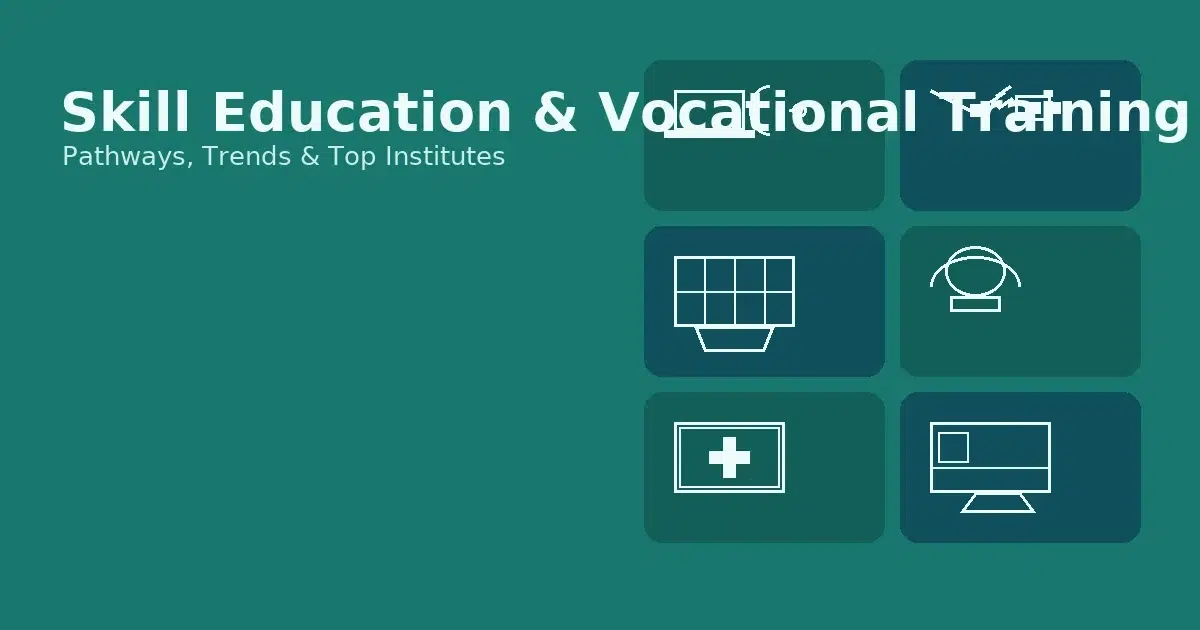Skill Education & Vocational Training: Pathways, Latest Trends, Top Institutes (India & World) and Career Outcomes
3rd October, 2025
What Does Skill Education Cover?
Program Models & Qualifications
- Short-term certificates (3–6 months): job-oriented skills (e.g., Cloud support, Solar technician, Digital video editing).
- Diploma/Advanced Diploma (1–2 years): deeper technical training + internships; good for freshers & upskilling.
- Degree-linked VET: B.Voc/Skill-integrated FYUGP with multiple exits; blends general education with NSQF-aligned skills.
- Apprenticeships: NAPS/NATS models with paid, on-the-job training; strong placement pipelines.
- Global & vendor certifications: CompTIA, AWS/Google/Microsoft, Adobe, Autodesk, PMI, Cisco, Coursera-for-Campus/MOOC micro-credentials.
Latest Trends & Growth Areas
- Green & EV skills: solar PV, energy auditing, EV maintenance, battery mgmt, charging infra.
- Digital & cyber: IT support, cloud, SOC analyst, RPA, low-code automation.
- Smart manufacturing: mechatronics, robotics basics, PLC/SCADA, additive manufacturing.
- Healthcare & care economy: nursing assistants, phlebotomy, eldercare, medical coding.
- Hospitality & tourism rebound: culinary, bakery, front office, airline ground ops.
- Gig & creator economy: video editing, motion graphics, e-commerce storefront ops.
Top Skill/Vocational Institutes in India (alphabetical – not a ranking)
- NSDC partners (Sector Skill Councils) – national ecosystem of approved training partners.
- Government ITIs & Polytechnics – state/central institutes across trades.
- NAPS/NATS – apprenticeship pathways with industry stipends.
- Tata STRIVE / NASSCOM Foundation – IT/ITeS & employability.
- IHMs (Hospitality) – culinary, hotel ops, bakery.
- IGNOU & State Open Universities – B.Voc/skill diplomas + flexibility.
- University B.Voc providers – e.g., Delhi Univ. colleges, central/state universities with NSQF alignment.
- Private academies with strong placement tie-ups (city-specific; verify outcomes locally).
Verify NSQF level, trainer credentials, labs, apprenticeship partners, placement data, and refund/retake policies on official sites.
Global Benchmarks & Providers (alphabetical – not a ranking)
- Germany’s Dual Vocational Training (Ausbildung) – apprenticeship-centric model.
- UK Further Education Colleges – BTEC/City & Guilds; Higher Nationals.
- USA Community Colleges – Associate degrees + stackable certificates.
- Singapore ITE & Polytechnics – strong industry labs & employer links.
- Vendor certifications – AWS, Google, Microsoft, Cisco, Adobe, Autodesk; CompTIA (A+, Net+, Sec+).
- MOOCs & Micro-credentials – Coursera, edX, Udacity, FutureLearn (verify credit/recognition).
Careers, Salaries & Progression
- Entry roles: IT support/Service desk, junior editor/designer, solar installer, field technician, hospital assistant, F&B associate, warehouse associate.
- Apprentice → Technician → Supervisor: structured growth with vendor certs and soft-skills training.
- Bridge to degrees: credit transfer from B.Voc/diplomas; part-time degree completion; lateral entry options in some states.
- Entrepreneurship: repair services, design studio, cloud services reseller, EV charging operations, bakery/catering, logistics franchise.
Smart Choices: Tips for Parents & Students
- Outcomes first: demand offer letters/placement stats; talk to alumni; check employer list.
- Learn by doing: pick programs with labs, live projects, OJT, and apprenticeships (NAPS/NATS).
- Stack credentials: build a ladder (Certificate → Diploma → B.Voc → Global certs).
- Power skills: communication, Excel, customer handling, safety/5S—these drive promotions.
- Finance smartly: compare total cost; ask for fee protection, scholarships, or income-share/EMI plans.
FAQs
Is B.Voc equal to a regular degree?
Yes, it’s a recognised degree under NSQF with multiple exits. Many universities allow progression to PG/competitive exams; always check the target program’s policy.
What pays better—degree or skills?
In the first 1–3 years, strong skills + vendor certs + apprenticeship often beat generic degrees. Long-term growth depends on upskilling, soft skills, and experience.
How do I avoid poor-quality institutes?
Check NSQF alignment, labs, trainer profiles, employer MoUs, alumni outcomes, batch size, and grievance/redressal policy. Visit the campus before paying.
Can I switch abroad later?
Yes—via global certs, experience, and pathways like community colleges or skilled-migration routes. Language proficiency and equivalence checks apply.
Disclaimer: Lists are indicative and alphabetical (not rankings). Always verify NSQF level, admissions, fees, internships, and placement terms on official websites.

